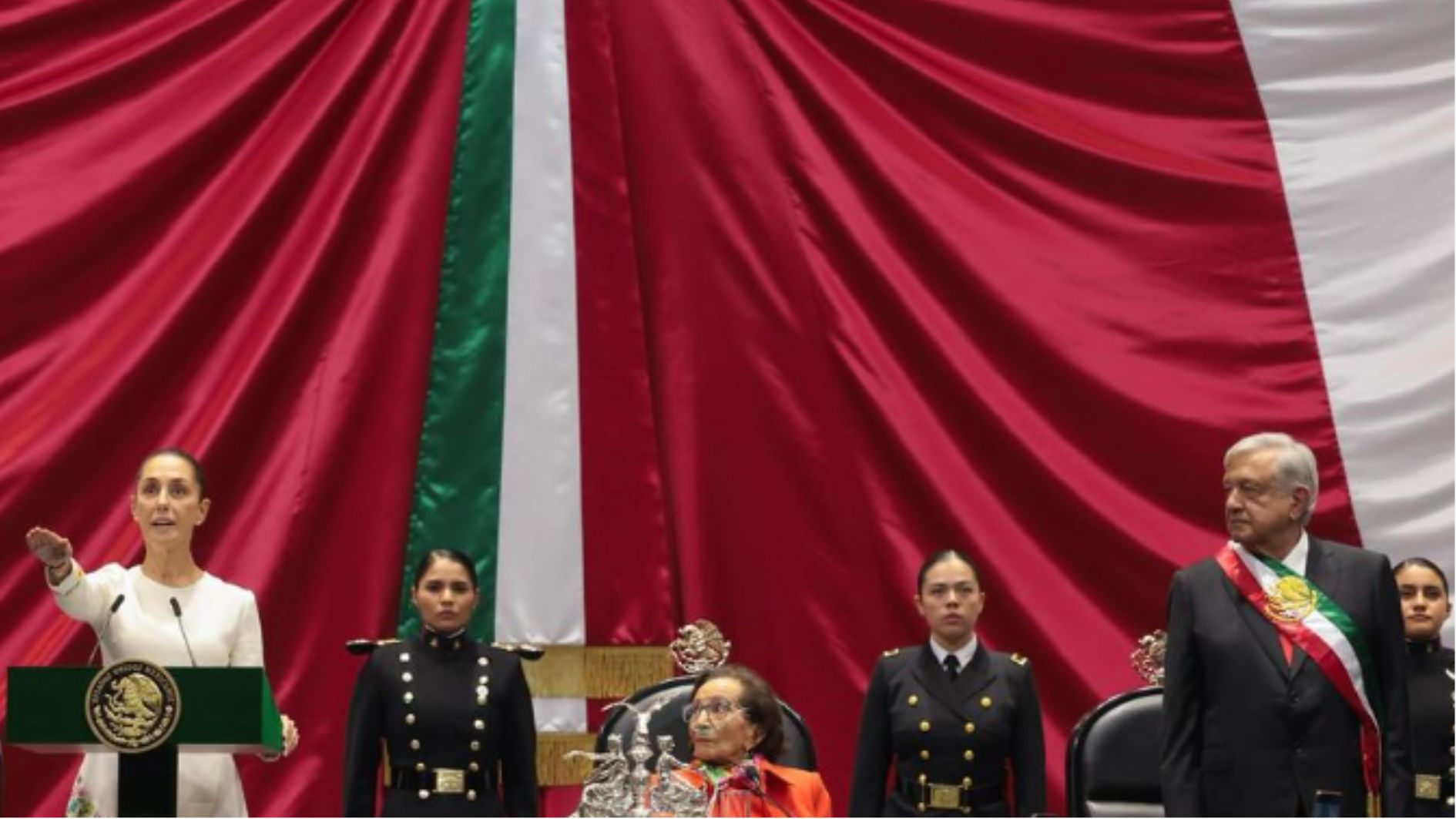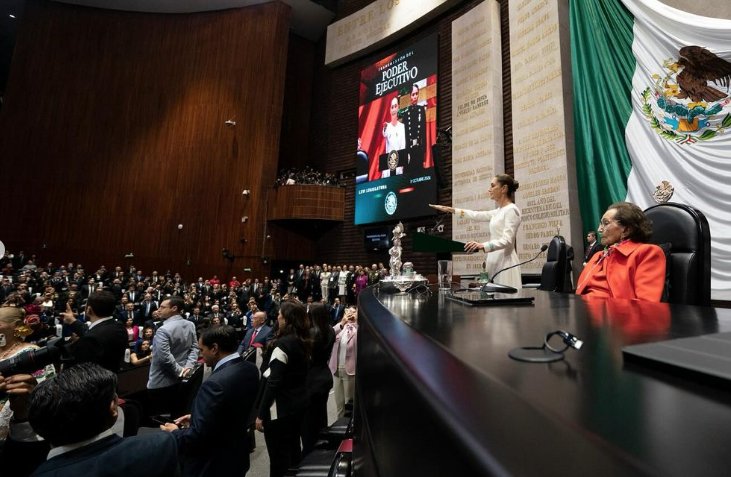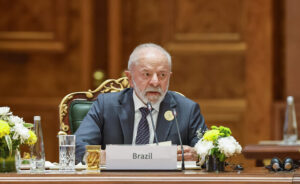
Published 01/10/2024 18:37 | Edited 10/01/2024 18:46
In a historic ceremony held this Tuesday (1st) at the Congress of La Union — the central legislative branch of Mexico —, the first woman to hold the presidency in the country’s history, Claudia Sheinbaum, took office. Feminist and successor to López Obrador, she highlighted that this is a “time of transformation and a time for women”.
Several heads of state and international delegations were present, including Brazilian president Luiz Inácio Lula da Silva, who had already met with Cláudia on the eve of the inauguration.
When starting her speech, Cláudia paid tribute to President Andrés Manuel López Obrador, remembering that exactly 19 years ago he gave a speech that “sowed, forever, the fight for democracy” in the face of an impeachment trial “whose sole objective was the attempt to an anticipated fraud.”
Also read: With Latin American leaders, Lula highlights “virtuous” GDP growth
The new president recalled that at that moment, Obrador told parliamentarians: “’you will judge me, but don’t forget that history still needs to judge you and me’”. Today, he added, “we say, with certainty and without fear of making mistakes, that history and the people judged him. Andrés Manuel López Obrador is one of the greats, the most important political leader and social fighter in modern history, the most beloved president, comparable only to Lázaro Cárdenas.”
The new president also referred to the legacy of the original Mexican peoples, saying that “the cultural greatness of Mexico lies in the great civilizations that lived in this land centuries before the Spanish invasion”.
In this sense, he highlighted: “it is not a coincidence, but a harmony of history, that yesterday the reform of the Political Constitution of the United Mexican States was published in the Official Gazette of the Federation, granting full rights to indigenous and Afro-Mexican peoples”.
Women’s hour

“On June 2 of this year, the people of Mexico, in a democratic and peaceful way, said out loud that it is time for transformation and it is time for women. And today, October 1, 2024, the second stage of the fourth transformation of public life in Mexico begins,” continued Claudia Sheinbaum.
She also highlighted that “after 200 years of Republic and 300 years of colony — because before that we do not have clear records —, that is, after at least 503 years, for the first time women begin to lead the destinies of our nation. And I say that ‘we arrived’ because I didn’t arrive alone, we all arrived.”
When outlining an overview of the Mexican nation, its symbols and history — especially that of its original peoples and women who fought to build the country —, the inaugurated president stated: “Mexico is that of the constitutionalists of 1917, of Lázaro Cárdenas who distributed land and expropriated oil; of Margarita Maza, of Adela Velarde who led the Adelitas in the revolution, of Dolores Jiménez Muro, of Elvia Carrillo Puerto and the suffragettes, of Frida Kahlo and Enriqueta González Bas, the first female mathematician”.
Also read: By electing its first president, Mexico inaugurates a new phase in the struggle of women
And he added: “Mexico belongs to the free women and men who throughout the 20th century fought for democracy, freedoms, justice, the students of 1968, the hundreds of men and women who are not here today, but of whom we are proud heirs.”
Cláudia also referred to the millions of fellow citizens who live in the United States. “Mexico is a wonderful country because of our cultural mosaic, because of our biodiversity. Mexico is wonderful thanks to our compatriots, heroes and heroines who live in the United States and who, out of love for their family and country, send their support every month.”
The president once again reaffirmed feminine strength by saying that “Mexico is a wonderful country because of its generous, supportive, happy, resilient, rebellious, wise and now empowered people”.
Mexican humanism
Inviting those present to reflect, Claudia Sheinbaum listed some of the main achievements achieved in recent years, asking, rhetorically: “How did 9.5 million Mexican men and women, according to the World Bank, escape poverty in just six years? How is it that, without increasing taxes, inequalities were reduced? How come we are one of the least indebted countries with the strongest currency in the Organization for Economic Cooperation and Development? How come we are one of the countries with the least unemployment?”
The answer, he explained, “is that the country’s development model changed, from the failed neoliberal model and the regime of corruption and privileges, to a model that emerged from Mexico’s fertile history, love for the people and honesty. We call this Mexican humanism and that is why we speak of a profound transformation. With this thought and its implementation, many myths and deceptions of the past have fallen.”
To give an example, he pointed out: “during the neoliberal period, which cost so much to the people of Mexico and which marked our history for 36 long years, it was said that the State should be diluted or subordinated to market forces, that if the economy were watered from above, it would reach those below; that if the minimum wage increased there would be inflation and there would be no foreign investment; that if the State participated in the economy there would be an economic crisis and devaluation; that corruption was inherent in the government; that freedom only exists in the market and that education, health, housing and fair wages were commodities and not rights. Everything turned out to be false. Therefore, for the good of Mexico, of everyone, we will continue with Mexican humanism.”
Next, she summarized the principles that have guided this transformation process. “One: for there to be prosperity, it must be shared, that is, for the good of all, first the poor. Second, there cannot be a rich government with poor people.”
She added that rulers must live without privileges, nor can they be a burden on the people. “This is what we call republican austerity”, he highlighted, adding that government officials must be honorable and honest.
He also pointed out that the highest principle of democracy is government of the people, by the people and for the people. He also said that development and well-being “can only be strengthened by caring for the environment and natural resources”.
The president reaffirmed the sovereignty of the Mexican nation, added that politics must be done with love and not hate and condemned elitism, racism, machismo, as well as any form of discrimination. “This is not just a question of tolerance, it is about recognizing that the deepening of inequalities will always lead to injustice. Brotherhood means seeing each other as equals”, he added.
Regarding foreign policy, he stressed that he will follow the constitutional principles of people’s self-determination, non-intervention and peaceful resolution of conflicts. He also said that “we will continue to strengthen our economic and cultural relationship with the countries of Latin America and the Caribbean. History and commitment unite us, as well as with different countries and regions of the world.”
After talking about some of her government goals, Claudia concluded her speech by returning to women’s issues. He said he would like to highlight the role not only of the nation’s known heroines, but also of the “anonymous, invisible heroines”, the “indigenous women, the domestic workers who leave their cities to support us”, the great-grandmothers “who did not learn to reading and writing because school was not for girls”, in short, to all “women, anonymous heroines who at home, on the streets or in the workplace fought to see this moment”.
Source: vermelho.org.br

